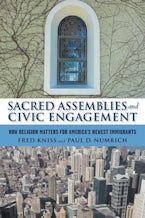The authors have managed to produce a book that is a model of rigorous scholarship, but is at the same time capable of attracting an audience not deeply grounded in that scholarship. It takes the sociological study of immigrant religion to a new state of development.
- Peter Kivisto (Richard Swanson Professor of Social Thought, AugustanaCollege) In their examination of the effects of religious ideas, identities, and practices on immigrant life and civic engagement patterns, the authors take up where traditional social science studies leave off. This book will make significant contributions to its field.
- Pyong Gap Min (coeditor of Religions in Asian America: Building Faith Communities) This book is an important reminder of the 'religious' aspects of immigrant congregations and how variations in religious doctrines, practices and identities influence civic engagement.
- Helen Rose Ebaugh, (author of Religion and the New Immigrants) There is a lot to learn here about immigrant religion and about congregational life generally. This is not a how-to book for interfaith relations, nor does it offer sound bite-style conclusions. But it is worth a careful reading. I found it to be generally optimistic- Kniss and Numrich show that there are several roads to adaptation to a new society and that religious organizations can be relevant in a variety of ways. Many people worry that increasing diversity is damaging the fabric of U.S. society. Carefully researched books such as this one provide plenty of reason to think otherwise.
(Christian Century) Sacred Assemblies and Civic Engagement is part of an emerging body of scholarship that counterbalances this trend. Kniss and Numrich examine immigrant congregations not simply as religious versions of ethnic enclaves, but as internally diverse, complex, and dynamic organizations that are civically engaged.
(Journal of American Ethnic History)

